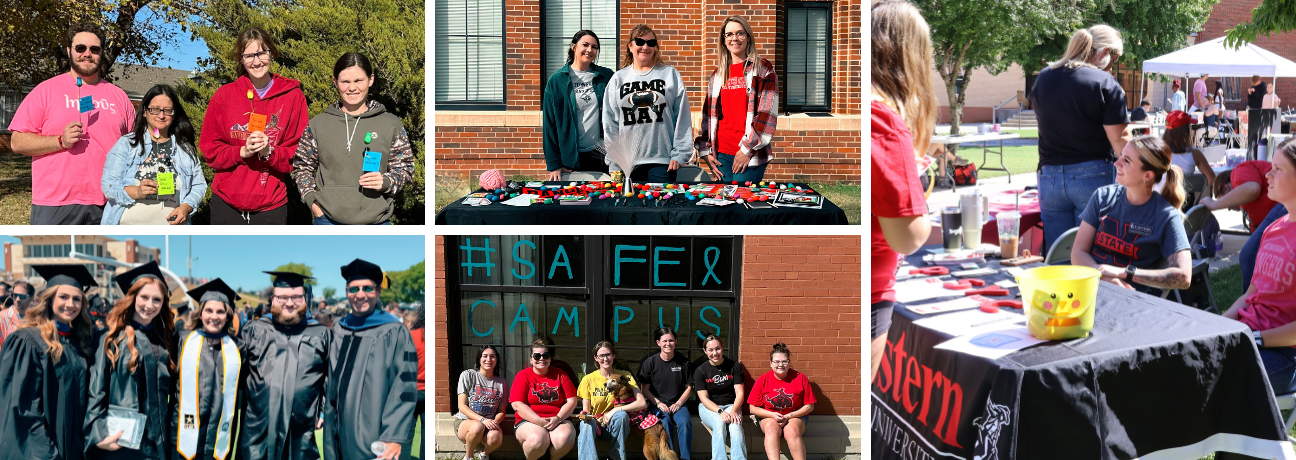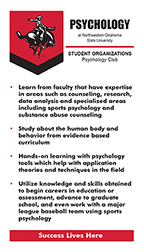
School of Professional Studies
Psychology
The Psychology Department at NWOSU offers a Bachelor’s Degree in Psychology with minors in Sports Psychology, Substance Abuse and General Psychology. The program has in place a comprehensive Student Success Plan that is designed to provide students with the necessary tools to take ownership of their learning and achieve success in the program and in life.
The department also offers a Master of General Psychology and a Master of Counseling Psychology with tracks in Licensed Professional Counselor and Licensed Alcohol and Drug Counselor. The program currently is being aligned for CACREP Accreditation in the future.
Contact:
Psychology Chair
Dr. Taylor Randolph
Assistant Professor of Psychology
Northwestern-Enid 114
Northwestern-Alva, Education Center 214
Northwestern-Alva
(580) 213-3119
jtrandolph@nwosu.edu
Clubs
Student Spotlight
Alicia Green, Enid, OK, Senior

"A degree in Psychology has taught me patience, understanding, and empathy for other people. I love learning about different theories of Psychology and cannot wait till I am able to use those theories in Graduate school and eventually in my career as a counselor. The best part of the Psychology department at Northwestern is the teachers. They really care about their students and their successes. They are passionate about psychology and teaching. My time here has been amazing."

Degrees Offered
Bachelor's Degrees
Psychology
Minors
Psychology
Exercise and Sports Psychology
Substance Abuse
Master's Degrees
Master of Counseling Psychology
Master of General Psychology
For a detailed look at the course requirements and descriptions for these degrees, please see the Undergraduate Catalog and Graduate Catalog.
Careers for Degree
Should I Major in Psychology?
Major in Psychology to:
- Signal an interest in people and interpersonal skills
- Work in human services
- Continue in a Psychology-related graduate field
- Plan a career requiring people skills
- Develop quantitative and research skills
My Parents Want to Know:
Will I be able to get a job with a bachelor's degree in Psychology?
- Nationally, less than 5 percent of Psychology majors report being unemployed
- It may not be in a field directly related to Psychology
Will I make any money?
- Yes, but not as much as in some other majors such as engineering. Jobs tend to be in public service areas.
How to Check Psychology Out
- Talk to some people who are majoring in Psychology
- Talk to Psychology instructors
- Take some Psychology classes as a part of your general education requirements
- Check out career services early
- Talk to professionals in the field of Psychology
Questions to Ask Yourself
- Do I like to work with people?
- Can I work with people who have problems?
- Is a Psychology major needed to reach my goal?
- How about the money?
- How do I know I will stay interested?
Some Jobs Held by Psychology Majors
|
Community and Social Services
Human Resources
Residential Care
Management and Business
|
Student Affairs/Services
Probation/Parole/Law Enforcement
Education
Scientific Research
|
Source: Morgan, B., & Korschgen, A. (2001) Majoring in Psych? Career options for psychology undergraduates (2nd ed.) Boston: Allyn and Bacon.
Degree Planning Resources
Departmental Program Highlights
 Learn from faculty that have expertise in areas such as counseling, research, data analysis and specialized areas including sports psychology and substance abuse counseling
Learn from faculty that have expertise in areas such as counseling, research, data analysis and specialized areas including sports psychology and substance abuse counseling- Study about the human body and behavior from evidence based curriculum
- Hands-on learning with psychology tools which help with application theories and techniques in the field
- Utilize knowledge and skills obtained to begin careers in education or assessment, advance to graduate school, and even work with a major league baseball team using sports psychology
Scholarships
Scholarship opportunities are available for students in this department.
Use the Psychology Department Scholarship Application Form to apply for foundation/departmental scholarships by February 15.
Departmental scholarships available in this area and more can be found at https://ournorthwestern.org/make-an-investment/scholarships, including numerous miscellaneous unspecified scholarships.
Current students have until March 15 for academic scholarships using the Continuing Student Scholarship Application.
All incoming freshmen or transfers are encouraged to fill out their respective scholarship forms: Freshman Scholarship or Transfer Scholarship, which should be submitted along with the Application for Admission to the University. The incoming freshman deadline is May 15, while the transfer student deadline is July 15.
Students also should complete the FAFSA form at www.studentaid.gov.
For more information, please visit Scholarships.
Student Learning Outcomes
Knowledge Base of Psychology
SLO 1: Students will defferentiate major concepts, theoretical perspectives, empirical finding, and historical trends in psychology.
Research Methods in Psychology
SLO 2: Students will appraise basic research methods in psychology, including formulation of research design, appraisal of data analysis, and provide interpretation.
Critical Thinking Skills in Psychology
SLO 3: Students will examine and use critical and creative thinking, skeptical inquiry, and, when possible, the scientific approach to problem-solving.
Application of Psychology
SLO 4: Students will apply psychological priniciples to personal, social, and organizational issues.
Student Learning Outcomes - MCP
- Develop a foundation of professional orientation and ethical practice by examining the history of the counseling profession, recognizing ethical obligations, identifying counselors' roles and responsibilities, developing advocacy for the profession, and understanding the role of the professions within the community (CACREP, 2016, Section 2.F.1).
- Examining social and cultural diversity by evaluating pluralistic characteristics among diverse groups, comparing theories of multicultural counseling, reviewing contextual factors of diverse populations, and evaluating the role of counselor with social justice and advocacy (CACREP, 2016, Section 2.F.2).
- Human growth and development will be evaluated by examining theories related to normal and abnormal development for individuals and families across the lifespan, regarding learning, personality development, and addiction behaviors (CACREP, 2016, Section 2.F.3).
- Evaluate career and lifespan development by comparing theories and models of career development, utilizing assessment for career determination and advocating for diverse clients in the workforce (CACREP, 2016, Section 2.F.4).
- Examine counseling and helping relationships by displaying a knowledge of the several therapeutic approaches to the treatment of human pathology, comparing theoretical foundations, and demonstrating strategies and techniques utilized to assess human behavior when working with individuals of all ages (CACREP, 2016, Section 2.F.5).
- Investigate group counseling and group work through evaluation of theoretical foundations, examine group dynamics, demonstrate what makes an effective group leader, and provide experiential group activity (CACREP, 2016, Section 2.F.6).
- Demonstrate historical detail behind assessment and testing. Administer, interpret, and analyze various forms of tests (individual, group, vocational, personality). Use assessments for diagnostic and intervention planning (CACREP, 2016, Section 2.F.7).
- Research and program evaluation by critiquing research methods, evaluating basic statistics, using needs assessments, and demonstrating analysis of data (CACREP, 2106, Section 2.F.8).
Student Learning Outcomes - MGP
The student learning objectives for the MGP degree need to be updated to read:
- To evaluate and utilize advanced knowledge and theories from psychology and related disciplines to identify, develop, and implement best practices in the Behavioral Sciences field.
- To summarize and critique the psychology literature including core theories.
- To demonstrate their understanding and ability to implement basic and applied research designs used to address psychological issues.
- To engage in complex, evidence-based practice.
- To communicate both orally and in writing at a level that is appropriate for professionals in the Behavioral Sciences field.
- To demonstrate the ability to work ethically and effectively with diverse student populations.
- To evaluate innovative approaches to mental health issues leading to holistic care for individuals, families, and communities.
- To demonstrate critical thinking and accountability related to behavioral sciences.
State Licensure Information
